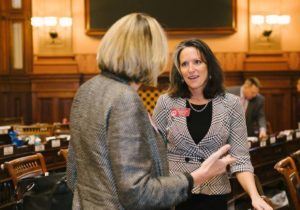Trump’s Georgia visit brings awareness to lesser known destruction from Hurricane Helene
Former President Donald Trump visited Augusta, Georgia, Friday to discuss ongoing recovery efforts after Hurricane Helene.
The storm, which has killed more than 220 people, left a trail of…

Former President Donald Trump visited Augusta, Georgia, Friday to discuss ongoing recovery efforts after Hurricane Helene.
The storm, which has killed more than 220 people, left a trail of devastation all over the South, including floods, mudslides and downed trees and power lines.
In the Augusta area alone, which is near the South Carolina border, there have been at least 28 storm-related deaths, WRDW reported. The area “ended up sitting under the absolute worst part of the storm from a wind perspective,” the National Weather Service-Columbia said on X.
“This is the worst administration in the history of our country,” Trump said after arriving in Augusta, where he was joined by Georgia Gov. Brian Kemp. “We are here in Evans, Georgia, to express our support, love and prayers.”
“When you look and see the kind of suffering that’s going on right now, but one of the biggest questions is that there’s so many people missing,” he continued, calling it a “very heartbreaking situation.”
Earlier in the press conference, Kemp talked about what the state has been doing to respond in the aftermath of the storm, including “suspending the gas tax for as long as we’re under a state of emergency and waiving the penalty on the use of dyed diesel fuel in street vehicles,” and “urging FEMA to add more impacted counties to the federal declaration list.”
When members of the press asked Trump, the Republican nominee for president, about the upcoming election, he responded, “I’m not thinking about voters right now. I’m thinking about lives.”
Vice President Kamala Harris, the Democratic nominee for president, also visited Augusta in recent days.
Not all locals appreciated the presidential contenders visiting.
“No person who requires the secret service or a full entourage security detail belongs at a disaster site,” Justina Gilliam told The Lion. “The optics are never what they hope for. Harris is being criticized for her low-key visit and Trump is being criticized for his high profile one. Neither of them belong here.”
Gilliam also said the media coverage of Augusta’s devastation is “atrocious,” explaining how her mother in North Carolina did not hear that Augusta had been hit until five days after the hurricane.
She also shared an Instagram video from her daughter of their property before and after the storm.
But another resident, Serah Blair, praised Trump’s visit for bringing attention to the affected area.
“I think Trump coming into Georgia will help immensely in the hurricane relief efforts,” Blair told The Lion. “Trump has a massive following and draws attention wherever he goes. I pray that President Trump will bring more awareness to the aftermath of Helene in Georgia and in our neighboring states.”
Blair had a gas pipe burst at her home due to Helene which was not fixed for 24 hours.
She also criticized FEMA saying, “They’re not fully financially capable of providing” the victims with the necessary relief to help “get back on our feet.
“There are mounds of tree branches, debris, and trash that have been sitting outside houses for days now, and nobody has come to pick them up, despite being told that FEMA would be coming and taking care of them,” she said. “Some mounds are so high you cannot see the houses or businesses behind them. Where are they?”
Doug Duncan, chairman of the Columbia County Board of Commissioners, told The Lion about the response how various levels of government are responding, and how Kemp asked him to visit the area to “bring media exposure to the devastation” without disrupting recovery efforts.
Kemp also told him Trump had reached out and “asked if there’s anything he could do to help specifically.”
Duncan said most people outside of the Augusta area “have no grasp of how bad it was. We had the ice storm ten years ago, and this is five to six times larger.”
He also explained how the community, as well as local and state governments have taken charge of the crisis by bringing back power, which began with “100% no power to 70% powered up.”
In comparison to other regions, Augusta is moving at an incredible pace, Duncan added, before offering a jab at the Federal response:
“The government is not going to be all things to all people, and then it frankly shouldn’t be all things.”



